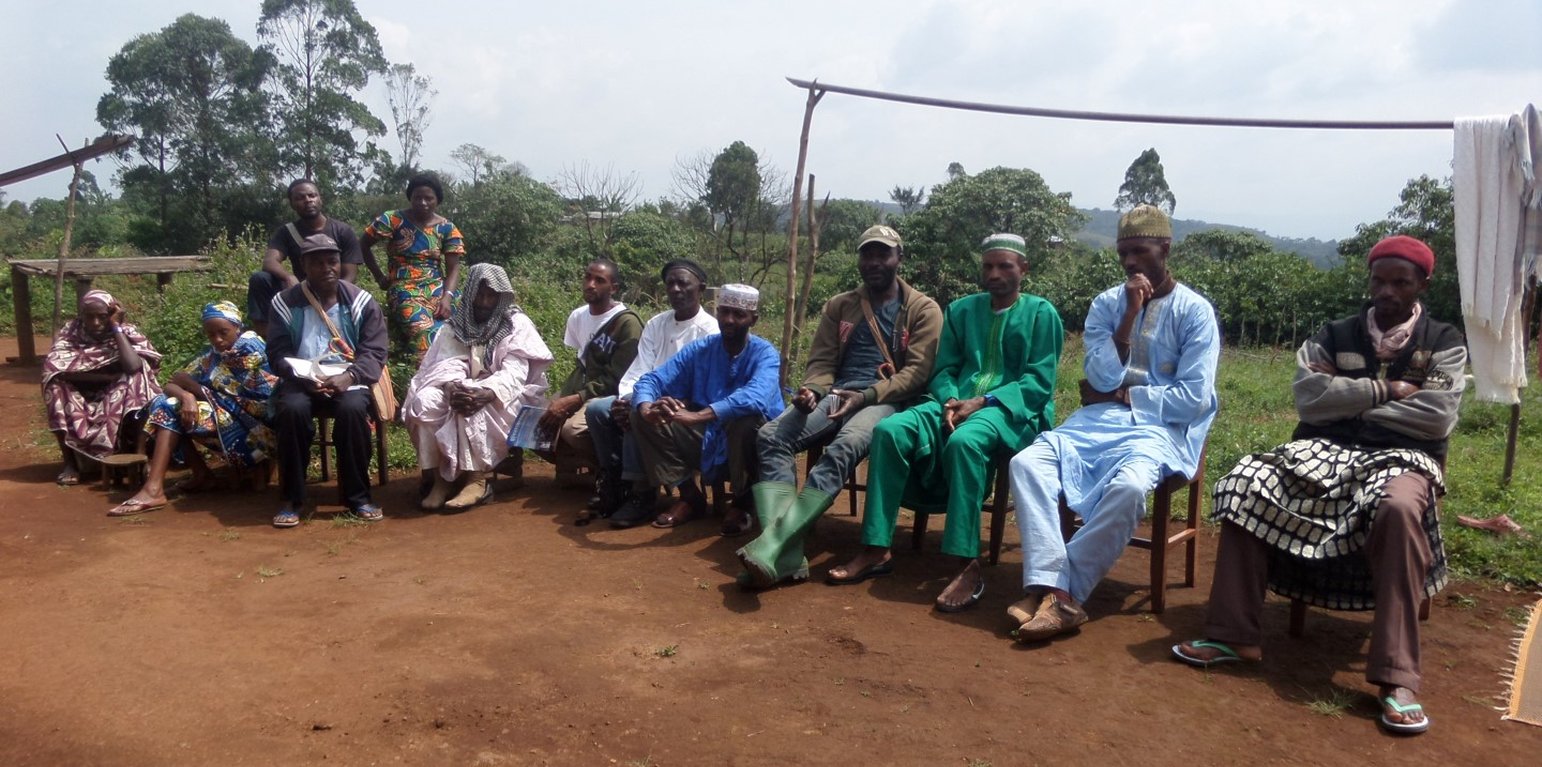Promoting farmers and pastoralists consultations in managing rangelands.
(Cameroun)
Dialogue platforms
Description
Dialogue platforms bring together rangeland users including farmers, pastoralists/agro pastoralists to learn, discuss and implement low stake conflict mitigation strategies and mutually beneficial alliances.
Dialogue Platforms (DP) are usually made up of between 12 to 14 community members with a balance from pastoralist and farming communities. Members are selected from within the community on the basis of their track records on peace building, objectivity and interest in the development of their community. The objectives of these platforms include: promoting: inter-community dialogue in natural resources sharing and access; sensible resource management; and both mutual beneficial relationships and constructive conflict resolution and mitigation. The Alternative Conflict Management (ACM) approach is generally used and this seeks to address the question of how people can make better decisions together, particularly on difficult, contentious issues. This is implemented as an alternative to more adversarial or non-consensual strategies, such as judicial or legal recourse, unilaterally initiated public information campaigns or partisan political action.
The stages of this multi-stakeholder dialogue process mainly facilitated by 'Paralegals' and 'Community Resource Volunteers' of the Mbororo Social and Cultural Development Association (MBOSCUDA) are as follows:
1. Identification of stakeholders who are mainly farmers, pastoralists and agro pastoralists but may also include representatives of traditional authorities, the local administration and technical services
2. Awareness-raising about the approach
3. Setting-up of the DP and capacity building of members in conflict mediation techniques of the Alternative Crisis Management (ACM) approach, which stresses negotiation and mediation in resolving resource access/use conflicts
4. Monitoring of the functioning of the DP
5. Promoting the emergence of beneficial production relations between farmers and pastoralists
Lieu
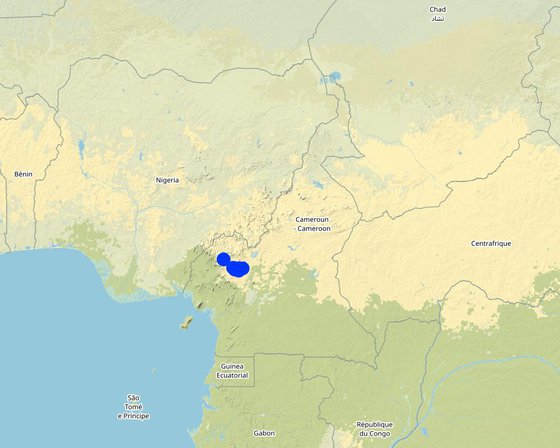
Lieu: This approach has been piloted in 23 communities in the North West Region., North West Region, Cameroun
Géo-référence des sites sélectionnés
-
10.65674, 5.65486
-
10.50177, 5.65616
-
10.13807, 5.98589
-
10.72266, 5.65486
-
10.13811, 5.98589
-
10.72266, 5.56739
-
10.56885, 5.61113
-
10.56885, 5.61113
-
10.5161, 5.6534
-
10.87646, 5.65486
-
10.65674, 5.65486
Date de démarrage: 2011
Année de fin de l'Approche: 2018
Type d'Approche
-
traditionnel/ autochtone
-
initiative/ innovation récente locale
-
fondé sur un projet/ programme
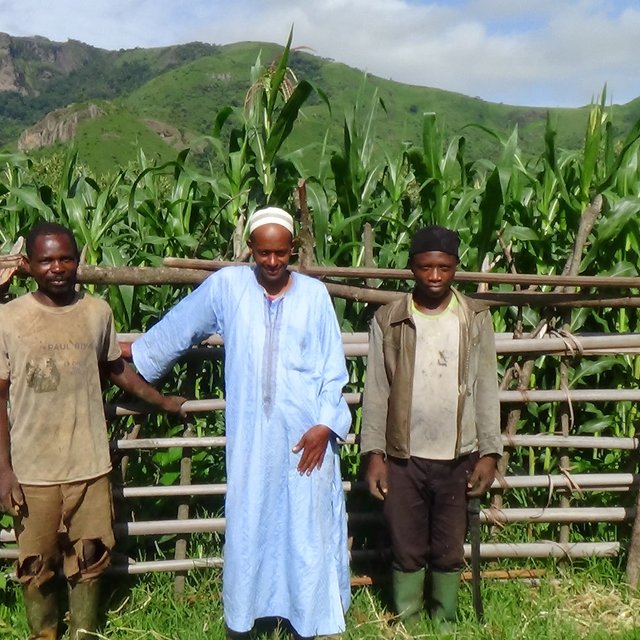
Two farmers (left and right) entered an alliance with the pastoralist (middle) to farm on land in which animals had been kraaled. (MBOSCUDA North West Region, Cameroon)
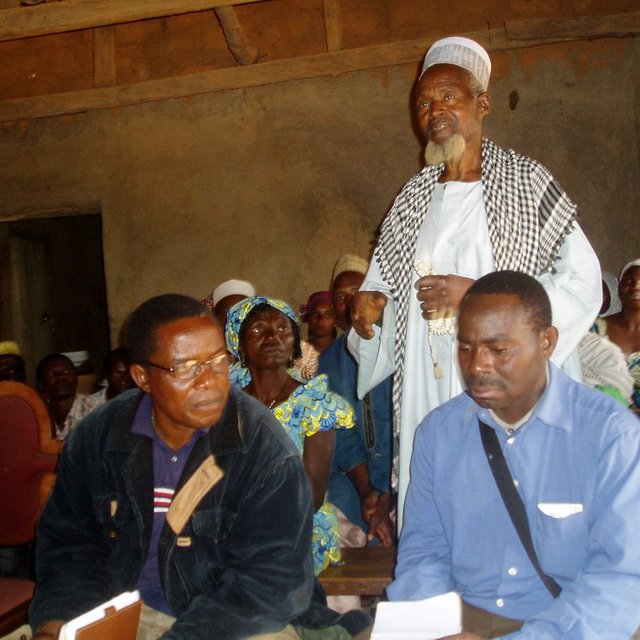
Awareness-raising and mobilization meeting for formation of Dialogue Platform. (MBOSCUDA North West Region, Cameroon)
Objectifs de l'approche et environnement favorable
Principaux objectifs de l'Approche
- Articulation and mediation of different interests in resource use and sharing.
- Promotion of beneficial relationships.
- Sustainable resource (land and water) management.
- Constructive conflict resolution.
Conditions favorisant la mise en oeuvre de la/(des) Technologie(s) appliquée(s) sous l'Approche
-
Collaboration/ coordination des acteurs: The success of this approach is critically hinged on collaboration between the main local actors - usually farmers and pastoralists - and also the facilitation skills of the 'Paralegals' and 'Community Resource Volunteers' of MBOSCUDA, the community-based organization facilitating the emergence of this approach.
-
Cadre juridique (régime foncier, droits d'utilisation des terres et de l'eau): This approach has yet to get formal backing from the state. This formal backing can only come when it is recognised in the state laws.
-
Gouvernance foncière (prise de décisions, mise en œuvre et application des décisions): This decentralization of decision- making, implementation and enforcement creates an enabling atmosphere for the emergence of community dialogue platforms. Also, the land tenure system of the country is under review and it is hoped that the draft provisions creating and recognizing dialogue platforms will be maintained.
-
Connaissances sur la GDT, accès aux supports techniques: The presence of paralegals and 'community resource volunteers' from MBOSCUDA, a local community-based organization, facilitates the emergence of dialogue platforms. They provide support in terms of training and backstopping, and also carry out monitoring and evaluation.
-
Marchés (pour acheter les intrants, vendre les produits) et prix: n.a. since this is an institutional measure.
Conditions entravant la mise en oeuvre de la/(des) Technologie(s) appliquée(s) sous l'Approche
-
Normes et valeurs sociales/ culturelles/ religieuses : Cultural differences between two main land user (pastoralists and crop farmers) may hinder smooth functioning of approach. Pastoralists are predominantly Moslems while farmers are Christians. So possibilities of clashes over religious values e.g. Moslems don't drink alcohol or eat pork which may be served during gatherings.
-
Disponibilité/ accès aux ressources et services financiers: This approach does not depend on availability/access to financial resources and services.
-
Cadre institutionnel: Presently the institution set up by law at the level of every sub division to adjudicate farmer-pastoralists' a conflict is the Agro-Pastoral Commissions (APC) which have been dubbed as corrupt and inefficient in handling these conflicts. Some are even known to help perpetuate these conflicts for their selfish ends. The members of these APCs may see in this new approach the end of their prerogatives, since conflicts will no longer be brought to them as farmers and pastoralists try to settle their conflicts amongst themselves without recourse to a third party.
-
Collaboration/ coordination des acteurs: Absence of collaboration between the main local actors (farmers and pastoralists) will greatly hinder the smooth functioning of dialogue platforms.
-
Cadre politique: Too much reliance on animal health care to the detriment of rangelands science and governance in government policy. This pre-dates independence and even continues up to recent times where efforts have been oriented towards the reinforcement of veterinary infrastructure, with little concern about facilitating the emergence of structures at the local level for negotiating multiple and complementary uses of resources.
-
Marchés (pour acheter les intrants, vendre les produits) et prix: n.a. since this is an institutional measure.
-
Charge de travail, disponibilité de la main-d'œuvre: The DP members render their services pro bono (free of charge). This calls for extra effort and sacrifice on their part. They can be hindered in offering these services if they also have their own private and personal matters to attend to, such as working in their fields to tend crops or animals.
Participation et rôles des parties prenantes impliquées dans l'Approche
Parties prenantes impliquées dans l'Approche et rôles
| Quels acteurs/ organismes d'exécution ont été impliqués dans l'Approche? |
Spécifiez les parties prenantes |
Décrivez le rôle des parties prenantes |
| exploitants locaux des terres / communautés locales |
Rangeland users: pastoralists and farmers. |
Pastoralists and farmers drawn from the communities, because of their integrity, constitute members of dialogue platforms. They look into conflicts presented to them by local people to mediate and find low stake solutions for them. |
| organisations communautaires |
Mbororo Social, Cultural and Development Association (MBOSCUDA). |
Facilitated the emergence of this approach by organising and sponsoring capacity building workshops for DP members through their consultants and also paralegals and community resource volunteers, who closely follow-up the functioning of DPs. |
| Spécialistes de la GDT/ conseillers agricoles |
Consultants . |
Consultants were brought in to train DP members in conflict management, leadership skills and group dynamics. |
| chercheurs |
Researchers. |
Compiling and documentation of practice. |
| gouvernement national (planificateurs, décideurs) |
Cameroon government. |
Called upon to recognize/formalize this low stake conflict mediation/resolution approach. |
| organisation internationale |
SNV Netherlands Development Organisation. Village Aid - a UK based charity. Comic Relief - UK based charity.
Department of International Development (DFID) UK.
|
Provision of funding for programme activities. |
Participation des exploitants locaux des terres/ communautés locales aux différentes phases de l'Approche
aucun
passive
soutien extérieur
interactive
auto-mobilisation
initiation/ motivation
Because of the endemic conflicts over resource use and access in the community, the local people saw the setting- up of DP as a felt need. So local people, together with MBOSCUDA operatives, jointly analysed the situation and came up with the need to create DPs as a low stake solution to resolving farmer-pastoralists conflicts without the involvement of administrative, judiciary and law enforcement officials who were seen instead to be inefficient and corrupt.
planification
Joint planning sessions between local people and MBOSCUDA operatives were held to map out activities. Locals then designated members from their communities to serve as DPs, and these members were supposed to be of high standing in the communities.
mise en œuvre
Activities are implemented by DP members with support from MBOSCUDA operatives (paralegals and Community Resource Volunteers).
suivi/ évaluation
For now the monitoring/evaluation of DPs is done by Community Resource Volunteers supported by MBOSCUDA with a fuel allowance to go round and backstop the functioning of DPs.
Diagramme/ organigramme
During a village or quarter assembly convened by traditional authorities and facilitated by MBOSCUDA operatives, the conflicting relationship between farmers and pastoralists is discussed and participants undertake a firm commitment to work towards improving it. The idea of a dialogue platform as a low stake measure in mitigating and resolving resource access/use is presented and community support and recognition is solicited. Community members are then called upon to designate members (between 12- 14 in number, and with at least 2 to 3 women and youths) to make up a DP for the village/quarter. The DP members are then capacitated to carry out their duties through short courses in conflict management and leadership skills, group dynamics and the existing legal framework on land tenure. They go ahead with carrying out their duties which are then monitored by MBOSCUDA operatives. The improved dialogue in the community - especially between farmers and pastoralists - then fosters the forming of farming alliances between the two groups.
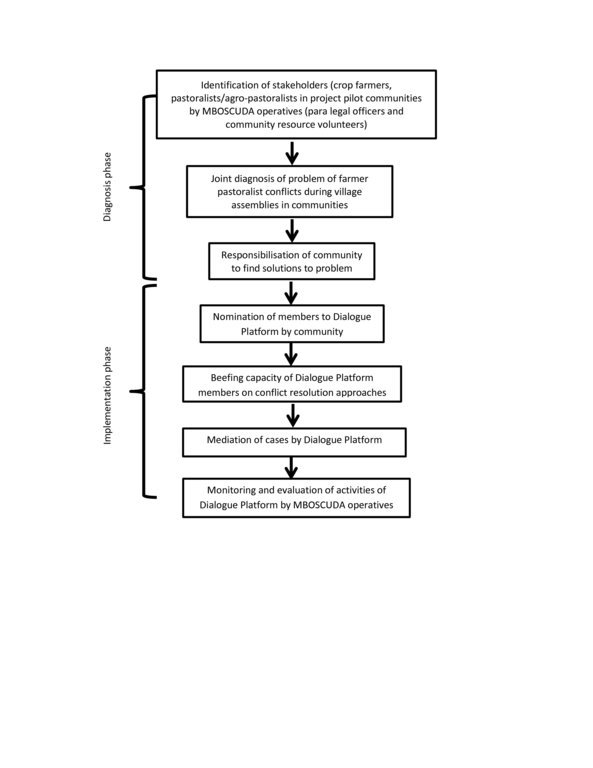
Auteur : Blasius Azuhnwi
Prises de décision pour la sélection de la Technologie de GDT
Les décisions ont été prises par
-
les exploitants des terres seuls (auto-initiative)
-
principalement les exploitants des terres soutenus par des spécialistes de la GDT
-
tous les acteurs concernés dans le cadre d'une approche participative
-
principalement les spécialistes de la GDT, après consultation des exploitants des terres
-
les spécialistes de la GDT seuls
-
les responsables politiques/ dirigeants
Les décisions ont été prises sur la base de
-
l'évaluation de connaissances bien documentées en matière de GDT (prises de décision fondées sur des preuves tangibles)?
-
les résultats de recherches?
-
expériences et opinions personnelles (non documentées)
Soutien technique, renforcement des capacités et gestion des connaissances
Les activités ou services suivants ont fait partie de l'approche
-
Renforcement des capacités/ formation
-
Service de conseils
-
Renforcement des institutions (développement organisationnel)
-
Suivi et évaluation
-
Recherche
Renforcement des capacités/ formation
La formation a été dispensée aux parties prenantes suivantes
-
exploitants des terres
-
personnels/ conseillers de terrain
Formats de la formation
-
sur le tas
-
entre agriculteurs (d'exploitants à exploitants)
-
zones de démonstration
-
réunions publiques
-
cours
Sujets abordés
- Conflict Management.
- Mediation Skills.
- Leadership Skills
- Group Dynamics.
- Existing legal framework.
Service de conseils
Le service de conseils était fourni
-
dans les champs des exploitants?
-
dans des centres permanents
Follow-up by MBOSCUDA operatives in the farmers' fields to see the effectiveness of conflict resolution outcomes arrived at by DPs.
Renforcement des institutions
Institutions ont été renforcées ou mises en place
-
non
-
oui, un peu
-
oui, modérément
-
oui, beaucoup
Décrivez l'institution, ses rôles et responsabilités, ses membres, etc.
The Dialogue Platform members’ capacities have been built on resolving conflicts.
MBOSCUDA's (Mbororo Social and Cultural Development Association) capacity has been built to function as a better community grassroots support organisation.
Type de soutien
-
financier
-
renforcement des capacités/ formation
-
équipement
Plus de détails
These refresher courses gave participants the opportunity to share best practices and identify key weaknesses in mediating farmer-herder conflicts.
Suivi et évaluation
A conflict database to ensure effective monitoring of the outcomes of the project and capture trends of conflicts in the Region has been put in place and hosted by MBOSCUDA.
Financement et soutien matériel externe
Budget annuel en dollars US de la composante GDT
-
< 2 000
-
2 000-10 000
-
10 000-100 000
-
100 000-1 000 000
-
> 1 000 000
Precise annual budget: sans objet
This has been mainly from international charities and donors such as: mainly Big Lottery Fund through Village Aid but also other UK charities e.g. United Purpose; Front line Defenders; Comic Relief; Guernsey Overseas Aid Commission; Charles Heywood Foundation and Evan Cornish Foundation but also individuals e.g. Veronica Wigley and Oliver Maxwell Sawyer of the UK.
Les services ou mesures incitatives suivantes ont été fournis aux exploitants des terres
-
Soutiens financiers/ matériels fournis aux exploitants des terres
-
Subventions pour des intrants spécifiques
-
Crédits
-
Autres incitations ou instruments
Soutiens financiers/ matériels fournis aux exploitants des terres
This was mostly in terms of stationery (files, paper, pen and papers) for the functioning of DPs provided by MBOSCUDA. This stationery is mostly used in documenting the proceedings and outcome of DPs mediation efforts.
en partie financé
entièrement financé
équipement: outils
Didactic material (files, rim of papers, pen and papers)
La main d'oeuvre fournie par les exploitants des terres était
-
volontaire
-
vivres-contre-travail
-
payée en espèces
-
récompensée avec un autre soutien matériel
Analyses d'impact et conclusions
Impacts de l'Approche
Non
Oui, un peu
Oui, modérément
Oui, beaucoup
Est-ce que l'Approche a autonomisé les exploitants locaux des terres, amélioré la participation des parties prenantes?
This approach has greatly empowered local land users who increasingly do not have to turn to third parties (traditional authorities, administrative and judicial authorities or law and enforcement officers) to adjudicate in land use conflicts but seek recourse in Dialogue Platforms.
Est-ce que l'Approche a permis la prise de décisions fondées sur des données probantes?
Decisions are being made at the local level by Dialogue Platform members who are in tune with the local realities
Est-ce que l'Approche a aidé les exploitants des terres à mettre en œuvre et entretenir les Technologies de GDT?
An interesting and beneficial outcome of DPs has been the emergence of stronger integrated farming systems, strengthening synergies between crop farmers and pastoralists known locally as “Alliance Farming” which is win-win for both crop farmers and pastoralists.
Est-ce que l'Approche a amélioré les connaissances et les capacités des exploitants des terres pour mettre en œuvre la GDT?
From the farming alliances that have developed as an outcome of the implementation of this approach, community members are engaging in more sustainable ways of growing crops, as farmers make use of dung and urine from cattle and don't have to rely only on chemical fertilizers.
Est-ce que l'Approche a amélioré les connaissances et les capacités des autres parties prenantes?
Capacities were considerably improved through the courses that the various stakeholders received; the conflicts that the DPs resolved in practice, considerably improved their capacities
Est-ce que l'Approche a construit/ renforcé les institutions, la collaboration entre parties prenantes?
Conflicts between land users have decreased in numbers, frequency and intensity as community members have come to see the need for mutual co-existence of two farming or land use systems (crop farming and livestock production).
Est-ce que l'Approche a atténué les conflits?
Conflicts have considerably decreased in project communities.
Est-ce que l'Approche a autonomisé les groupes socialement et économiquement défavorisés?
The Mbororos who are the cattle- rearers have come to gain in confidence and overcome the low self-esteem they had in themselves, and also the poor perception other communities had of them.
Est-ce que l'Approche a amélioré l'égalité entre hommes et femmes et autonomisé les femmes et les filles?
For inclusiveness, it is statutory that at least 3 members of the Dialogue Platform are women. This is particular important in Mbororo communities where women face double marginalization - for being women and for living in predominantly patriarchal societies, and also for being pastoralists who still live on the fringes of society.
Est-ce que l'Approche a encouragé les jeunes/ la prochaine génération d'exploitants des terres à s'engager dans la GDT?
For inclusiveness, youths are statutory members of dialogue platforms.
Est-ce que l'Approche a amélioré les questions foncières et des droits d'utilisation qui entravent la mise en œuvre des Technologies?
Pastoralists’ rights have been strengthened by this approach. The rights they have over the rangelands they inhabit and use for their livelihood were mostly usufruct rights, but farmers increasingly through this approach and its related technology - the Alliance Farming - acknowledge the other rights (such as right of management) that pastoralists have over the rangelands they inhabit. They are no longer looked upon as 'strangers' by farming neighbours because of their late settlement in the North West Region of the country.
Est-ce que l'Approche a conduit à améliorer la sécurité alimentaire et/ou la nutrition?
With the improved social climate between pastoralists and farmers, more time can be devoted to agriculture.
Est-ce que l'Approche a conduit à améliorer l'accès à l'eau et l'assainissement?
The improved social climate has led to community members jointly engaging in projects such as catchment area protection for water supplies.
Est-ce que l'Approche a conduit à l'utilisation/ sources d'énergie plus durables?
Biogas use by community members has increased as some of dung is used as input for the biogas plants which generate energy for domestic use.
Est-ce que l'Approche a conduit à des emplois, des opportunités de revenus?
Community members, because of reduced conflicts, have time to gainfully engage themselves in their farm enterprises, diversify their livelihood options as well such as engage in other business activities.
Principale motivation des exploitants des terres pour mettre en oeuvre la GDT
-
augmenter la production
-
augmenter la rentabilité/ bénéfice, rapport coûts-bénéfices
-
réduire la dégradation des terres
-
réduire les risques de catastrophe
-
réduire la charge de travail
-
paiements/ subventions
-
règles et règlements (amendes)/ application
-
prestige, pression sociale/ cohésion sociale
-
affiliation à un mouvement/ projet/ groupe/ réseaux
-
conscience environnementale
-
coutumes et croyances, morale
-
améliorer les connaissances et compétences en GDT
-
améliorer l'esthétique
-
atténuer les conflits
Durabilité des activités de l'Approche
Les exploitants des terres peuvent-ils poursuivre ce qui a été mis en oeuvre par le biais de l'Approche (sans soutien extérieur) ?
A present trend observed is where farmers and pastoralists go ahead to resolve conflicts among themselves even without the intervention of DPs - indicating that the approach is sustainable.
Conclusions et enseignements tirés
Points forts: point de vue de l'exploitant des terres
-
It has opened up dialogue between farming and pastoral communities, who for the most part were “at daggers drawn”. This has improved social cohesion between the two, as seen in the emergence of mutual beneficial farming alliances between farmers and pastoralists.
-
In cases of compensation for crop damage or injury/death of animals, this is handed to the victim and not to administrative or judiciary authorities as is the case with the Agro-Pastoral Commissions, the statutory institution that arbitrates conflicts between farmers and pastoralists.
-
It has allowed them the possibility of avoiding uncertainty, time, cost and stress in going through the Agro-Pastoral Commissions or the courts.
Points forts: point de vue du compilateur ou d'une autre personne-ressource clé
-
Low stake conflict prevention/ resolution mechanism compared to the present one involving the intervention of administrative, judiciary or law enforcement officials which has proved to be ineffective and fraught with corruption. It is workable, affordable and adaptable to local realities.
-
It has created an enabling environment for the emergence of mutually beneficial farming relationships and considerably reduced the hostility between the two major land users - pastoralists and farmers.
-
Quite informal, voluntary and flexible.
Faiblesses/ inconvénients/ risques: point de vue de l'exploitant des terrescomment surmonter
-
DP members will want some form of compensation for their time and effort.
Putting in place a local mechanism to help compensate DP members for their time and effort.
Faiblesses/ inconvénients/ risques: point de vue du compilateur ou d'une autre personne-ressource clécomment surmonter
-
Not yet recognized by law and so decisions taken by DPs are not legally binding.
Recognition and or formalization will go a long way to make them legally binding.
Références
Examinateur
-
Rima Mekdaschi Studer
-
Joana Eichenberger
Date de mise en oeuvre: 14 décembre 2017
Dernière mise à jour: 2 novembre 2021
Personnes-ressources
-
Blasius Azuhnwi (azuhnwibn@yahoo.com) - Spécialiste GDT
Description complète dans la base de données WOCAT
Données de GDT correspondantes
La documentation a été facilitée par
Institution
- Mbororo Social and Cultural Development Association (MBOSCUDA) - Cameroun
Projet
- Book project: Guidelines to Rangeland Management in Sub-Saharan Africa (Rangeland Management)
- In Search of Common Ground
Références clés
-
Breakthrough (A publication of MBOSCUDA vols 1,2,3 and 4: Free from MBOSCUDA office
-
Making Rangelands More Secure in Cameroon, ILC Rangelands Series, Issue Paper 8, by Blasius Azuhnwi: Free from ILC Rome
-
Mid Term Evaluation Report of 'In Search of Common Ground' for Farmer-Grazer Conflicts in the North West Region of Cameroon. August 2016 by Nchinda Valentine, Che Marcellus, Tata Precillia Ijang, Shidiki Abubakar & Chi Napoleon: Free from MBOSCUDA
Liens vers des informations pertinentes disponibles en ligne
